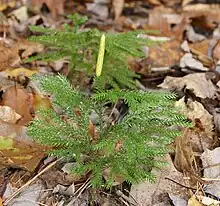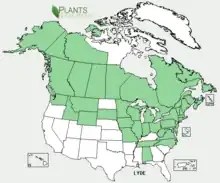Dendrolycopodium dendroideum
Dendrolycopodium dendroideum, synonym Lycopodium dendroideum, known as tree groundpine,[1] is a North American species of clubmoss. It is part of a complex of species colloquially known as groundpine, which taxa were formerly lumped into the species Lycopodium obscurum.[2][3] The species is native to Russia and also to the colder parts of North America (all states and provinces in Canada except Nunavut; northern and east-central United States including Alaska).[4] The genus Dendrolycopodium is accepted in the Pteridophyte Phylogeny Group classification of 2016 (PPG I),[5] but not in other classifications, which submerge the genus in Lycopodium.[6]
| Dendrolycopodium dendroideum | |
|---|---|
 | |
| Scientific classification | |
| Kingdom: | Plantae |
| Clade: | Tracheophytes |
| Clade: | Lycophytes |
| Class: | Lycopodiopsida |
| Order: | Lycopodiales |
| Family: | Lycopodiaceae |
| Genus: | Dendrolycopodium |
| Species: | D. dendroideum |
| Binomial name | |
| Dendrolycopodium dendroideum (Michx.) A. Haines | |
 | |
| Synonyms | |
| |
Dendrolycopodium dendroideum prefers humus-rich, sandy, moist but not completely saturated soils. It is very similar to D. obscurum except for side shoots that are round in cross-section rather than flat, and having leaves all the same size.[7]
Uses
Historically, this and other related clubmosses had been collected for decorative Christmas greenery. Overharvesting clubmosses destroys the slow growing, increasingly rare plant. The spore of this species was also collected as Lycopodium powder for use in early photography, although this was not the preferred species for the purpose.
References
- USDA, NRCS (n.d.). "Lycopodium dendroideum". The PLANTS Database (plants.usda.gov). Greensboro, North Carolina: National Plant Data Team. Retrieved 24 June 2015.
- Haines, Arthur. 2003. Families Huperziaceae and Lycopodiaceae of New England 84.
- Hickey, R. J. 1977. The Lycopodium obscurum complex in North America. American Fern Journal 67: 45--49.
- Biota of North America Program 2014 state-level distribution map
- PPG I (2016). "A community-derived classification for extant lycophytes and ferns". Journal of Systematics and Evolution. 54 (6): 563–603. doi:10.1111/jse.12229. S2CID 39980610.
- Christenhusz, Maarten J.M. & Chase, Mark W. (2014). "Trends and concepts in fern classification". Annals of Botany. 113 (9): 571–594. doi:10.1093/aob/mct299. PMC 3936591. PMID 24532607.
- Flora of North America, Lycopodium dendroideum Michaux, Fl. Bor.-Amer. 2: 282. 1803. Prickly tree club-moss, lycopode dendroïde
